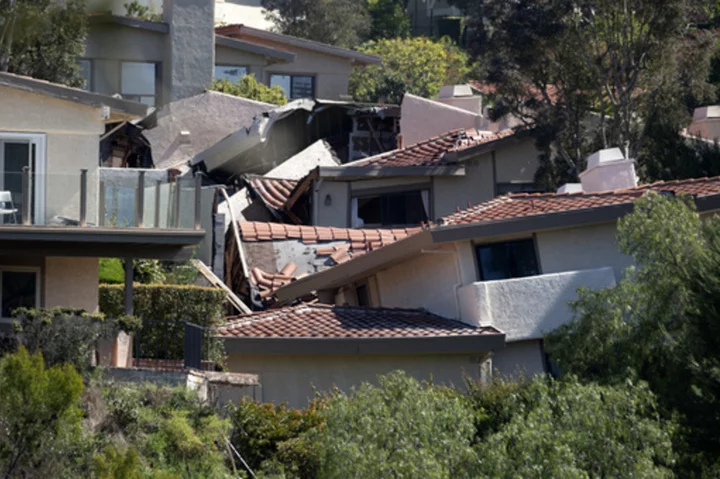ROLLING HILLS ESTATES, Calif. (AP) — A dozen homes torn apart by earth movement on Southern California's Palos Verdes Peninsula during the weekend were likely to fall into an adjacent canyon, an official said.
The homes in the Los Angeles County city of Rolling Hills Estates were hastily evacuated by firefighters on Saturday when cracks began appearing in structures and the ground.
Walls and roofs began to fail as the land continued to slide, the county Fire Department showed in video released on social media.
Significant land movement overnight completely destroyed the homes, Janice Hahn, chair of the Los Angeles County Board of Supervisors, said in a social media post Sunday.
“To think that these homes were intact, you know, yesterday afternoon, and today you can hear the creaking, the cracking, the crumbling,” Hahn told a news conference Sunday. “They’re going to fall.”
The city was collaborating with county agencies and the Red Cross to support displaced residents, Mayor Britt Huff said in a statement.
Officials did not know yet what caused the earth movement, said Pete Goodrich, a Rolling Hills Estates building official.
Damaging landslides have occurred previously on the Palos Verdes Peninsula, which rises high above the Pacific on the county's south coast and offers residents spectacular views of the ocean and greater Los Angeles.
A landslide that began in 1956 destroyed 140 homes in the Portuguese Bend area of the city of Rancho Palos Verdes, and earth continues to move there. The slide coincided with construction of a road through the area, which is atop an ancient landslide.
Among other notable earth movements on the peninsula, a 2011 slide severed the blufftop ocean road near White Point in the San Pedro section of Los Angeles several months after engineers began noticing cracks and fenced off the area for study.
Southern California's complex landscapes contribute to landslides, according to an overview by the U.S. Geological Survey in conjunction with the California Geological Survey.
Some of the many potential factors include steep slopes caused by tectonic deformation, uplifted geologically young sediment that has yet to harden, old rocks sheared by tectonic motion, and water percolating down into the earth after heavy rains, the report says.
Human-induced landslide factors include construction without proper grading of slopes, alteration of drainage patterns and disturbances of old landslides.









